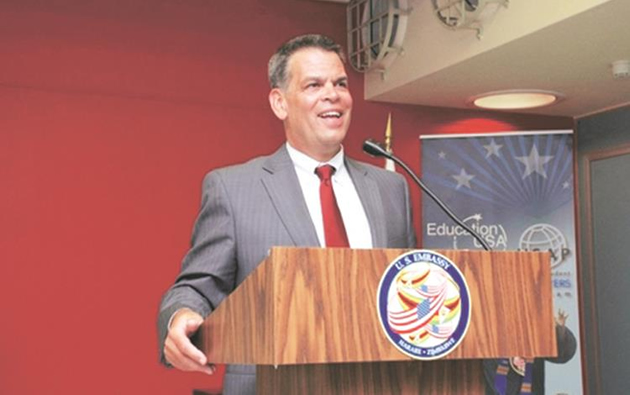Zim must ride on IMF’s positive feedback
In a challenged economy such as Zimbabwe’s, any positive news assumes great significance as it aids in boosting confidence, which in turn gives impetus to recovery. Such has been the case this week with news from the International Monetary Fund that the country met The Fund’s Staff Monitored Programme (SMP) targets. I have never really been a fan of IMF programmes since the days of the dreadful Economic Structural Adjustment Programme that brought untold suffering to this country.
I am still to understand what was good about Esap in all its stages.
Whether it was a wrong prescription or poor implementation I do not know but the results therefrom are something that makes me cringe in trepidation.
I am almost convinced that certain levels of poverty being experienced by some people in this country are a direct result of Esap. Of course Dr Bernard Chidzero must be turning in his grave but I am convinced Esap was the worst thing to ever happen to Zimbabwe.
Back to the SMP, we are excited about progress made and conditions and targets under this programme are practical and effective in reinvigorating the economy.
“Zimbabwe met all the required targets that we set for the end of June review period. We strongly believe that Zimbabwe’s decision to re-engage international financial institutions will go a long way in instilling confidence within the country’s economy. This is a great step towards the proposed debt rescheduling,” said the IMF head of Mission to Zimbabwe Mr Domenico Fanizza.
This vote of confidence in Zimbabwe’s efforts will give energy to Zimbabwe’s drive to re-establish relations with the international financial institutions.
Remember they all take a cue from the IMF. The statement coincides and fits perfectly well with the country’s drive to lure funders as enunciated by Finance Minister Patrick Chinamasa a few weeks ago.
Targets under the SMP programme included a budget balance for central government, expenditure on social sectors such as health and education, building foreign currency reserves and a ceiling on Government-guaranteed non-concessional debt of more than one year tenure.
A new successor programme would be introduced this month, ending in December 2015. This would provide for a coherent macro-economic framework to promote inclusive growth in line with the Zimbabwe Agenda for Sustainable Socio-Economic Transformation.
The new programme would be seized with restoring confidence in the banking sector, mobilising support for external debt, reforming the business climate, boosting productivity, competitiveness and building confidence, among other deliverables.
Commitment expressed by Government in implementing the reform agenda and policies under the successor SMP to speed up re-engagement with creditors would be critical for debt resolution.
Government is expected to create more fiscal space for more resources for infrastructure development, health, education and other critical social services that would be funded from ring-fenced budget allocations meant for the vulnerable.
We sincerely hope that Government will stick to its commitment that under the new programme, borrowings will be mainly for projects that generate inflows from which the debts would be paid. Discipline is the operating word in this instance.
Other complementing reforms will include the establishment of a national credit bureau by the central bank to improve its supervisory role and instil confidence in the banking sector.
This sounds good and progressive in terms of rebuilding the economy.
Overall, the fact that Zimbabwe managed to meet agreed targets in the first SMP, whose specifications in terms of numbers were not immediately available, says a lot about the potential in this economy to achieve certain targets what we all put our minds to it.
The IMF is one body that hardly smiles, particularly where Zimbabwe is concerned but to get a pat on the back from them is something we should cherish.
Of course Mr Fanizza was spot-on that the economy remained quite challenged due largely to inadequate financial inflows. But the country needs to ride on this positive feedback as it seeks funds to oil Zim Asset. Liquidity constraints have put paid to many an initiative but growing confidence by our partners will bring results.
Minister Chinamasa recently said Zimbabwe had made efforts to pay token sums to creditors who include the China Eximbank while discussions were undergoing with those we owe.
This will obviously open some financial doors for the economy.
Indeed we need to aggressively pursue international financiers and investors too to complement local efforts.
No situation, no matter how dire, is ever beyond redemption and it is primarily our efforts that will determine how far we can go.
Even the biggest economies in the world are fully cognisant of the fact that no economy is self-sufficient, moreso in a global village that the world has become.
The imperative for this economy, as clearly stated in the Monetary Policy Statement and the Fiscal Policy, is a significant
- Increase in production.
- Import substitution
- Policy clarity and consistency
- Perception management
- An ethos which substitutes consumption with production at all levels.
- Proactive stance on economic ills such as corruption, mismanagement, inertia and laxity.
- Foreign direct investment
- Employment creation for social stability
- Prudent allocation of resources.
- The diaspora factor
These are by no means comprehensive but are clearly some of the critical issues which need urgent redress.
Collectively we will attain the economic prosperity which we are hungry for.
The IMF, though always sounding rigid and even dangerously impartial, appears to be extending a hand of friendship. This is good but we need to aggressively pursue strategies for the institution to back its sweet words with funding.
The economy has been blushing from the positive review by the IMF but the economy desperately needs funds more than a mere pat on the back.
However, in breakfast discussions held recently, Mr Fanizza made it crystal clear that there were certain rules and regulations, and conditions met before this economy could smell a crispy dollar from the Bretton Woods institution.
So for now we may have to make do with SMP programme and a friendly international community as it warms up to efforts by this country to get the economy right.
In God I Trust!
Feedback : [email protected]







Comments